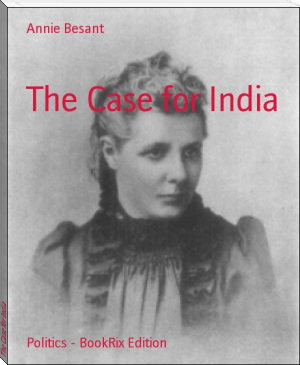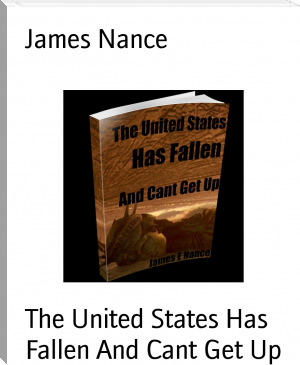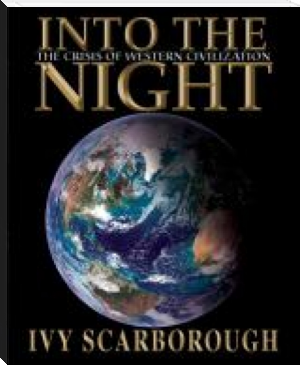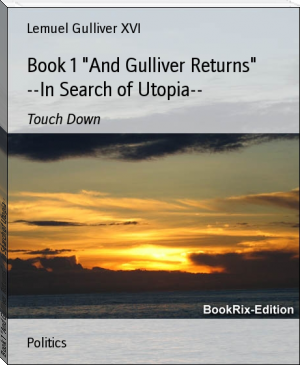The Case for India - Annie Besant (book series for 12 year olds TXT) 📗

- Author: Annie Besant
Book online «The Case for India - Annie Besant (book series for 12 year olds TXT) 📗». Author Annie Besant
those who dare to think and act for themselves, their ignorant
folly is only equalled by their arrogance. It is as though a
handful of schoolboys were to dictate to their masters
alterations in the traditional time-table, or to insist on a
modified curriculum.... These worthy people [officials] confuse
manly independence with disloyalty; they cannot conceive of
natives except either as rebels or as timid sheep.
Non-Official Anglo-Indians.
The problem becomes more complicated by the existence in India of a small but powerful body of the same race as the higher officials; there are only 122,919 English-born persons in this country, while there are 245,000,000 in the British Raj and another 70,000,000 in the Indian States, more or less affected by British influence. As a rule, the non-officials do not take any part in politics, being otherwise occupied; but they enter the field when any hope arises in Indian hearts of changes really beneficial to the Nation. John Stuart Mill observed on this point:
The individuals of the ruling people who resort to the foreign
country to make their fortunes are of all others those who most
need to be held under powerful restraint. They are always one
of the chief difficulties of the Government. Armed with the
prestige and filled with the scornful overbearingness of the
conquering Nation, they have the feelings inspired by absolute
power without its sense of responsibility.
Similarly, Sir John Lawrence wrote:
The difficulty in the way of the Government of India acting
fairly in these matters is immense. If anything is done, or
attempted to be done, to help the natives, a general howl is
raised, which reverberates in England, and finds sympathy and
support there. I feel quite bewildered sometimes what to do.
Everyone is, in the abstract, for justice, moderation, and
suchlike excellent qualities; but when one comes to apply such
principles so as to affect anybody's interests, then a change
comes over them.
Keene, speaking of the principle of treating equally all classes of the community, says:
The application of that maxim, however, could not be made
without sometimes provoking opposition among the handful of
white settlers in India who, even when not connected with the
administration, claimed a kind of class ascendancy which was
not only in the conditions of the country but also in the
nature of the case. It was perhaps natural that in a land of
caste the compatriots of the rulers should become--as Lord
Lytton said--a kind of "white Brahmanas"; and it was certain
that, as a matter of fact, the pride of race and the possession
of western civilisation created a sense of superiority, the
display of which was ungraceful and even dangerous, when not
tempered by official responsibility. This feeling had been
sensitive enough in the days of Lord William Bentinck, when the
class referred to was small in numbers and devoid of influence.
It was now both more numerous, and--by reason of its connection
with the newspapers of Calcutta and of London--it was far
better able to make its passion heard.
During Lord Ripon's sympathetic administration the great outburst occurred against the Ilbert Bill in 1883. We are face to face with a similar phenomenon to-day, when we see the European Associations--under the leadership of the _Madras Mail_, the _Englishman_ of Calcutta, the _Pioneer of_ Allahabad, the _Civil and Military Gazette_ of Lahore, with their Tory and Unionist allies in the London Press and with the aid of retired Indian officials and non-officials in England--desperately resisting the Reforms now proposed. Their opposition, we know, is a danger to the movement towards Freedom, and even when they have failed to impress England--as they are evidently failing--they will try to minimise or smother here the reforms which a statute has embodied. The Minto-Morley reforms were thus robbed of their usefulness, and a similar attempt, if not guarded against, will be made when the Congress-League Scheme is used as the basis for an Act.
The Re-action on England.
We cannot leave out of account here the deadly harm done to England herself by this un-English system of rule in India. Mr. Hobson has pointed out:
As our free Self-Governing Colonies have furnished hope,
encouragement, and leading to the popular aspirations in Great
Britain, not merely by practical success in the art of
Self-Government, but by the wafting of a spirit of freedom and
equality, so our despotically ruled Dependencies have ever
served to damage the character of our people by feeding the
habits of snobbish subservience, the admiration of wealth and
rank, the corrupt survivals of the inequalities of
feudalism.... Cobden writing in 1860 of our Indian Empire, put
this pithy question: "Is it not just possible that we may
become corrupted at home by the reaction of arbitrary political
maxims in the East upon our domestic politics, just as Greece
and Rome were demoralised by their contact with Asia?" Not
merely is the reaction possible, it is inevitable. As the
despotic portion of our Empire, has grown in area, a large
number of men, trained in the temper and methods of autocracy,
as soldiers and civil officials in our Crown Colonies,
Protectorates and Indian Empire, reinforced by numbers of
merchants, planters, engineers, and overseers, whose lives have
been those of a superior caste living an artificial life
removed from all the healthy restraints of ordinary European
Society, have returned to this country, bringing back the
characters, sentiments and ideas imposed by this foreign
environment.
It is a little hard on the I.C.S. that they should be foreigners here, and then, when they return to their native land, find that they have become foreigners there by the corrupting influences with which they are surrounded here. We import them as raw material to our own disadvantage, and when we export them as manufactured here, Great Britain and India alike suffer from their reactionary tendencies. The results are unsatisfactory to both sides.
The First Test Applied.
Let us now apply Gokhale's first test. What has the Bureaucracy done for "education, sanitation, agricultural improvement, and so forth"? I must put the facts very briefly, but they are indisputable.
_Education_. The percentage to the whole population of children receiving education is 2.8, the percentage having risen by 0.9 since Mr. Gokhale moved his Education Bill six years ago. The percentage of children of school-going age attending school is 18.7. In 1913 the Government of India put the number of pupils at 4-1/2 millions; this has been accomplished in 63 years, reckoning from Sir Charles Wood's Educational Despatch in 1854, which led to the formation of the Education Department. In 1870 an Education Act was passed in Great Britain, the condition of Education in England then much resembling our present position; grants-in-aid in England had been given since 1833, chiefly to Church Schools. Between 1870 and 1881 free and compulsory education was established, and in 12 years the attendance rose from 43.3 to nearly 100 per cent. There are now 6,000,000 children in the schools of England and Wales out of a population of 40 millions. Japan, before 1872, had a proportion of 28 per cent. of children of school-going age in school, nearly 10 over our present proportion; in 24 years the percentage was raised to 92, and in 28 years education was free and compulsory. In Baroda education is free and largely compulsory and the percentage of boys is 100 per cent. Travancore has 81.1 per cent. of boys and 33.2 of girls. Mysore has 45.8 of boys and 9.7 of girls. Baroda spends an. 6-6 per head on school-going children, British India one anna. Expenditure on education advanced between 1882 and 1907 by 57 lakhs. Land-revenue had increased by 8 crores, military expenditure by 13 crores, civil by 8 crores, and capital outlay on railways was 15 crores. (I am quoting G.K. Gokhale's figures.) He ironically calculated that, if the population did not increase, every boy would be in school 115 years hence, and every girl in 665 years. Brother Delegates, we hope to do it more quickly under Home Rule. I submit that in Education the Bureaucracy is inefficient.
_Sanitation and Medical Relief_. The prevalence of plague, cholera, and above all malaria, shows the lack of sanitation alike in town and country. This lack is one of the causes contributing to the low average life-period in India--23.5 years. In England the life-period is 40 years, in New Zealand 60. The chief difficulty in the way of the treatment of disease is the encouragement of the foreign system of medicine, especially in rural parts, and the withholding of grants from the indigenous. Government Hospitals, Government Dispensaries, Government doctors, must all be on the foreign system. Ayurvaidic and Unani medicines, Hospitals, Dispensaries, Physicians, are unrecognised, and to "cover" the latter is "infamous" conduct. Travancore gives grants-in-aid to 72 Vaidyashalas, at which 143,505 patients--22,000 more than in allopathic institutions--were treated in 1914-15 (the Report issued in 1917). Our Government cannot grapple with the medical needs of the people, yet will not allow the people's money to be spent on the systems they prefer. Under Home Rule the indigenous and the foreign systems will be treated with impartiality. I grant that the allopathic doctors do their utmost to supply the need, and show great self-sacrifice, but the need is too vast and the numbers too few. Efficiency on their own lines in this matter is therefore impossible for our bureaucratic Government; their fault lies in excluding the indigenous systems, which they have not condescended to examine before rejecting them. The result is that in sanitation and medical relief the Bureaucracy is inefficient.
_Agricultural Development_. The census of 1911 gives the agricultural population at 218.3 millions. Its frightful poverty is a matter of common knowledge; its ever-increasing load of indebtedness has been dwelt on for at least the last thirty odd years by Sir Dinshaw E. Wacha. Yet the increasing debt is accompanied with increasing taxation, land revenue having risen, as just stated, in 25 years, by 8 crores--80,000,000--of rupees. In addition to this there are local cesses, salt tax, etc. The salt tax, which presses most hardly on the very poor, was raised in the last budget by Rs. 9 millions. The inevitable result of this poverty is malnutrition, resulting in low vitality, lack of resistance to disease, short life-period, huge infantile mortality. Gopal Krishna Gokhale, no mischievous agitator, repeated in 1905 the figures; often quoted:
Forty millions of people, according to one great Anglo-Indian
authority--Sir William Hunter--pass through life with only one
meal a day. According to another authority--Sir Charles
Elliot--70 millions of people in India do not know what it is
to have their hunger fully satisfied even once in the whole
course of the year. The poverty of the people of India, thus
considered by itself, is truly appalling. And if this is the
state of things after a hundred years of your rule, you cannot





Comments (0)